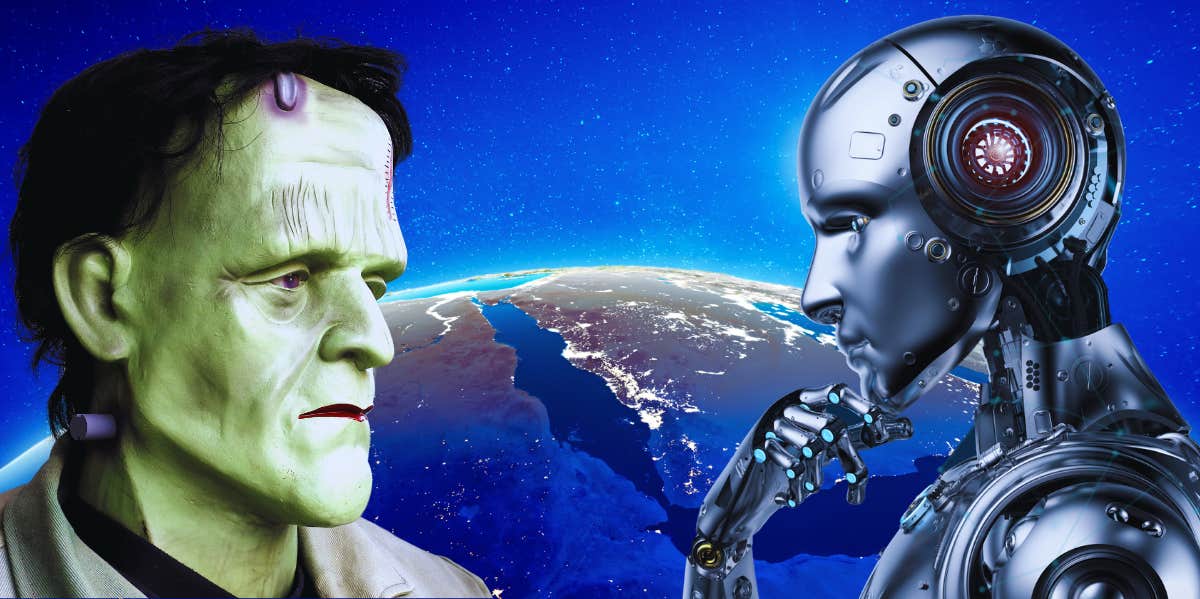The Potential For AI To Wipe Out Mankind Was Predicted As Far Back As 1818
Will human beings become the Neanderthals of today?
 Derick P. Hudson / Phonlamai Photo / ixpert / Shutterstock
Derick P. Hudson / Phonlamai Photo / ixpert / Shutterstock Everyday, technology is advancing further and further. Things that people used to have to figure out on their own are resolved in milliseconds using artificial intelligence (AI). Naturally, these advancements have led fears that machines will take over and change the world as we know it.
But fear about AI getting out of hand and, eventually, making human beings inferiors is not something new.
Way back in 1818, Mary Shelley wrote “Frankenstein,” a novel that cautioned about the possible dangers of scientific advancements in artificial intelligence. But was Mary Shelley's novel a prediction that humanity's use of AI could lead to its total destruction?
The Historical Background Of Mary Shelley and Frankenstein
Mary Shelley was a writer living in the Romantic Era, and though never married to poet Percy Shelley, she was in a relationship with him, as well as a friend to renowned poet Lord Byron. All three came together one stormy night at a summer home and challenged one another to write a “ghost story” influenced by the lightning and gloom.
That fateful night birthed Shelley’s book “Frankenstein,” one of the most celebrated writings in Western culture. The book was about a young man from Switzerland who was smart and affluent. He decided to create his own living being with the use of electricity and was later terrified at what he had created.
Though Frankenstein is generally characterized as a monster from the time of his creation in movies, the book frames him as an innocent being who just wanted to learn more about the world, but was shunned by society and, as a result, morphed into the monster we know him as today.
Because he had no woman to turn to and be nurtured, he was an "orphan," looking to exact revenge on the man that made him.
What is the Frankenstein Prophecy Theory?
The Frankenstein prophecy theory originally came to light in a 1935 interview where scientist and inventor, Nikola Tesla, shared his worries that human beings would develop technology so advanced and powerful that it would become self-aware and become a serious threat to humanity.
The history is shared in a TikTok video by Thomas Mulligan:
He referenced Mary Shelley’s "Frankenstein" as an example or even a foreboding of what was to come when the creations built by mankind become uncontrollable and turn on us. Tesla thought that inventors and scientists like himself needed to take extreme caution and consider the long-term implications of the work they do.
Since then, the Frankenstein prophecy theory has become a warning about developing technology recklessly and without thoroughly thinking through its consequences.
The point of calling this out is to highlight the necessity of ethical considerations in technological and scientific advancement, and in responsible innovation.
Yuval Noah Harari wrote “Sapiens: A Brief History of Humankind” in 2014 to track our developments throughout our existence. That book ends in a scary vision of the future where he suggests that we are living in our last days as we know them.
Harari theorizes that technology will progress so fast, it will surpass us in every way possible — physically, cognitively, and emotionally — rendering us inferior.
Think of it in the way you think of the future of humanity as you would Neanderthals, intellectually beneath today’s humans. Essentially, we would be the newest version of a Neanderthal, with AI taking our place as the most advanced creatures on the planet.
The Frankenstein story is a warning that “playing God” by creating life will subject us to the consequences of our actions and we will be severely punished.
Are recent technological advances pointing toward human extinction?
In recent history, artificial intelligence has advanced so fast that if you blink, you’d be lost. Machine learning is being used to automate processes and make predictions.
In addition, genetic engineering and biotechnology allow scientists to manipulate genetic codes and cure disease. Robots and automation are more prevalent in all industries, doing things that humans once did.
Devices are interconnected via the Internet of Things (IoT), and are constantly collecting and sharing data. And let’s not forget about the improvements in virtual realities and digital worlds.
These things can definitely raise red flags as they take over basic human functions and continue to expand their capacity to replace us. But no one can really be certain if and when this prophecy will occur.
There have been a number of predictions (think Y2K) that simply did not come true. But in many cases, due to the prediction, steps would be taken— safeguards put in place to assure that our worst fears didn’t come true.
As Tesla suggested, we do need to advance technology ethically and responsibly, assessing and decreasing risk as we go. As we move through history, as TikToker Mulligan said, we will also need a transformation of human consciousness to evolve as things around us do.
But we should also consider that rapid development of mankind thus far is making intellectual leaps and bounds of its own. Maybe these machines are meant to take on what we need them to, freeing us to, as Tesla said, “pursue [our] higher aspirations.”
NyRee Ausler is a writer and author from Seattle, Washington who entertains and informs readers with in-depth analysis of mysteries, legends, and myths.
